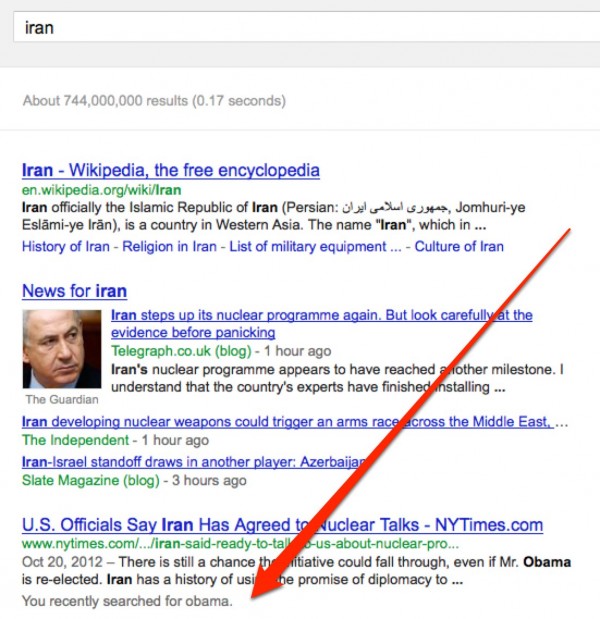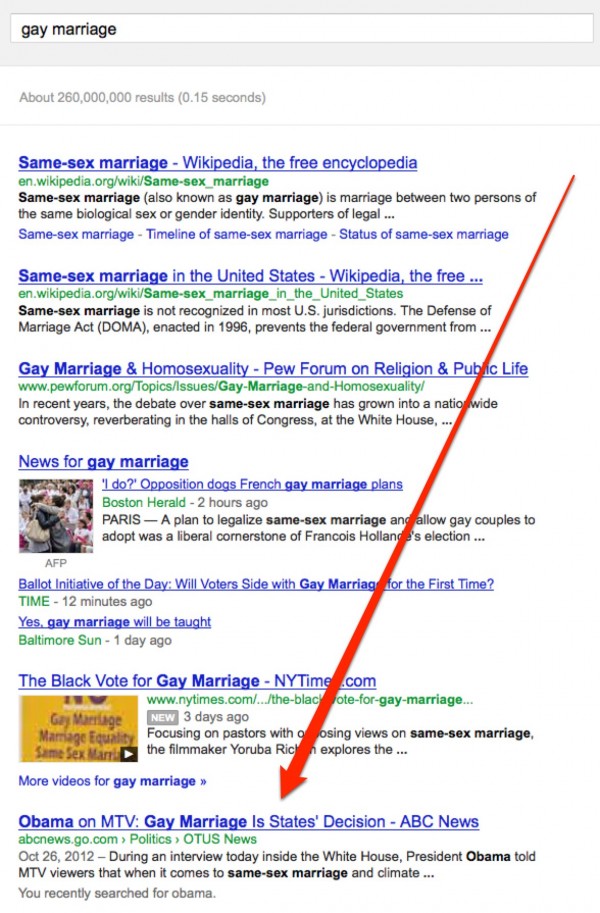Why Google “Personalizes” Results Based On Obama Searches But Not Romney
Do a search for “Obama,” and you might find your subsequent queries for things like “medicare” seemingly personalized based on your initial Obama search. Do the same for Romney, it is doesn’t happen. Is Google biased toward Obama, as some are now writing? No. Is it the “filter bubble” of personalization out of control? Perhaps […]
Do a search for “Obama,” and you might find your subsequent queries for things like “medicare” seemingly personalized based on your initial Obama search. Do the same for Romney, it is doesn’t happen. Is Google biased toward Obama, as some are now writing? No. Is it the “filter bubble” of personalization out of control? Perhaps not. In fact, it doesn’t even appear to be personalization at all.
The news of how searching for Obama can influence your subsequent search results came out in a Wall Street Journal story today, which conducted a battery of tests to explore the phenomenon. This followed on a tip and similar testing that Google-rival Duck Duck Go conducted. The Journal found that a search for Romney didn’t trigger the same changes.
The bigger story, by the way, isn’t that searching for Obama might influence what someone might see in future searches. Rather, it’s that searching for certain terms — Duck Duck Go likes to call them “magic keywords” — may influence future searches. I’ll explain this more as we go along. But let’s start with the Obama test.
Obama Search Influences Other Searches
It’s easy for anyone to do the Obama test. I’ve been able to confirm it multiple times, and whether I’m signed-in to Google, signed-out or appearing as a completely new person with no prior search history by using “Incognito” mode in the Chrome browser.
Search for “obama,” then search for “iran,” and you’ll likely see a news story about Iran with a message “You recently searched for obama” appearing below it:
You might not see exactly the same news story. But there’s a very good chance you’ll see some type of a news story or link with the “You recently searched message.”
Search for “obama” followed by “medicare” or “gay marriage,” and the same thing happens:
Now do the same thing by first searching for “romney” and then terms like “medicare” or “iran” or “gay marriage,” and this type of customization doesn’t happen.
Why It’s Not An Obama Bias
The first thing to clear up is that this isn’t some type of favoritism for Obama. That’s already starting to spread. The Journal said:
Google Inc.’s quest to guess what we want before we want it has produced an unusual side effect: a disparity in the results the company presents about the presidential candidates….
The search links are altered only for a short period, and there is no indication that Google is intentionally biasing its results….
In the hands of a human, decisions like these might be viewed as biased. For a Google algorithm, they are simply a matter of numbers.
The emphasis is that there’s some type of unique thing happening following Obama searches but that this type of bias isn’t something Google’s doing on purpose. It’s just part of how the algorithm works.
Bias is already a charged word which gets turned into Obama being “priortized” by The Verge:
Google shows personalized search results that prioritize Barack Obama for users that have recently searched for the President, but Mitt Romney isn’t getting the same treatment.
Over at CNET, it’s seen as unfairness:
Google isn’t treating searches related to Presidential candidates fairly, a new report charges.
Every search engine has biases that are a natural consequence of trying to rank web pages based on a wide-range of factors. But by no means are these results somehow doing something favorable for Obama over Romney.
It’s not like when you search for terms like “gay marriage” or “iran” after searching for Obama that you only get positive Obama news or news that somehow “prioritizes” Obama over Romney, whatever that’s supposed to mean.
Nor is Obama somehow getting a special advantage. Consider this listing you get for “medicare” immediately after searching for “obama,” one that does not appear after searching for “romney:”
If you’d previously searched for “obama,” you got this article suggested he — along with Romney — are wrong on Medicare. But if you searched for Romney, the article doesn’t appear, so Romney potentially gets favored by not having something negative about him appearing.
Why It’s Not A Filter Bubble
The next thing to clear up is the idea that this is some type of “filter bubble.” The term, popularized by Eli Pariser excellent book The Filter Bubble, means that each person is trapped within their own little bubble of personalized results, seeing things tailored only to them.
What’s happening here is almost the opposite. In the Wall Street Journal’s testing, about 80% of the people who had searched for Obama and then the subsequent terms saw some of the “You recently searched for” results appearing. Rather than them all being stuck in a bubble, most of them were actually having pretty much the same experience.
The caveat here is that I don’t know that they were all seeing the exact same news stories appearing. Moreover, Duck Duck Go’s testing suggests that the news sources themselves might be different. For instance, while everyone might get customized news links, one person might get a Fox News story while someone else a Los Angeles Times one. But if the results weren’t done at exactly the same time, or without all search history cleared properly, other issues than a filter bubble might be to blame.
If done right, where people all appear to Google as if they were brand new visitors with no search history at all, it’s hard for Google to personalize anything at all in a filter bubble way.
So Why The “Personalization?” & Magic Keywords
If it’s hard for Google to personalize without a search history, how can a single search for “Obama” cause this type of change to happen? Google is using the activity for a significant number of people to influence the “customization” it does for an even larger group.
Going back to the Wall Street Journal article, it says this:
Google said that the Obama-Romney disparity reflects the fact that more people searched for “Obama” followed by searches for “Iran” than the number of people who searched for “Romney” followed by “Iran.”
In other words, because Google has seen a number of people searching for Obama, then searching for these other terms, it has decided it makes sense to insert some Obama-oriented results into those other searches for many people.
This won’t just be for Obama, either. Other words trigger the same type of reaction (try a search for “cars” followed by a state or “travel” by some geographic location — these often work for me).
In the end, rather than producing personalized results, it’s more like “mass personalization.” A better term suggested by Julia Angwin, the WSJ reporter who wrote the story, as I emailed with her after it appeared, might be “mass customization.” Google is using the previous query actions from some to influence how it customizes results for the masses.
Previous Query & Notification
As a reminder, Google using someone’s previous queries to personalize results isn’t new. Google’s been doing that since 2008. What is new is the idea that the previous search activity of others can influence everyone’s results. Also fairly new is Google’s failure to notify in a consistent manner when such customization is happening or how to turn it off.
In 2008, when Google started using previous queries in a big way, it also rolled out a consistent way to notify people when this was happening, as our story below covers:
Over time, the little “customized” message that would appear dropped from the top of the page to the bottom to having disappeared sometime this year entirely.
Personalized results are supposed to be flagged as part of the new Search Plus Your World system that launched earlier this year, but I find that doesn’t always seem to happen. Meanwhile, I noticed last month that the control icon to switch personalized results on-and-off sometimes seems to disappear. It looks like this:

Perhaps, and I do see it now when logged in. But for those logged out, if they don’t want personalization or customization to happen based on their search history, this switch is definitely not showing, making it complicated to get more “normal” results.
Of course, it’s also important to remember there are no “normal” results. Google, like Bing, will tailor results based on your geography. That means everyone will see something slightly different. But still, for those who want a more “pure” search experience, Google could — and should — make it easier to get that.
Postscript: See our follow-up article, Of “Magic Keywords” & Flavors Of Personalized Search At Google.
Related Articles
- DuckDuckGo’s New Video Targets Google’s “Filter Bubble” Of Personalized Results
- Google Now Notifies Of “Search Customization” & Gives Searchers Control
- Google’s Personalized Results: The “New Normal” That Deserves Extraordinary Attention
- Bing Results Get Localized & Personalized
- Bing Gets More Personal With Adaptive Search
- Google’s Results Get More Personal With “Search Plus Your World”
Contributing authors are invited to create content for Search Engine Land and are chosen for their expertise and contribution to the search community. Our contributors work under the oversight of the editorial staff and contributions are checked for quality and relevance to our readers. The opinions they express are their own.
Related stories


